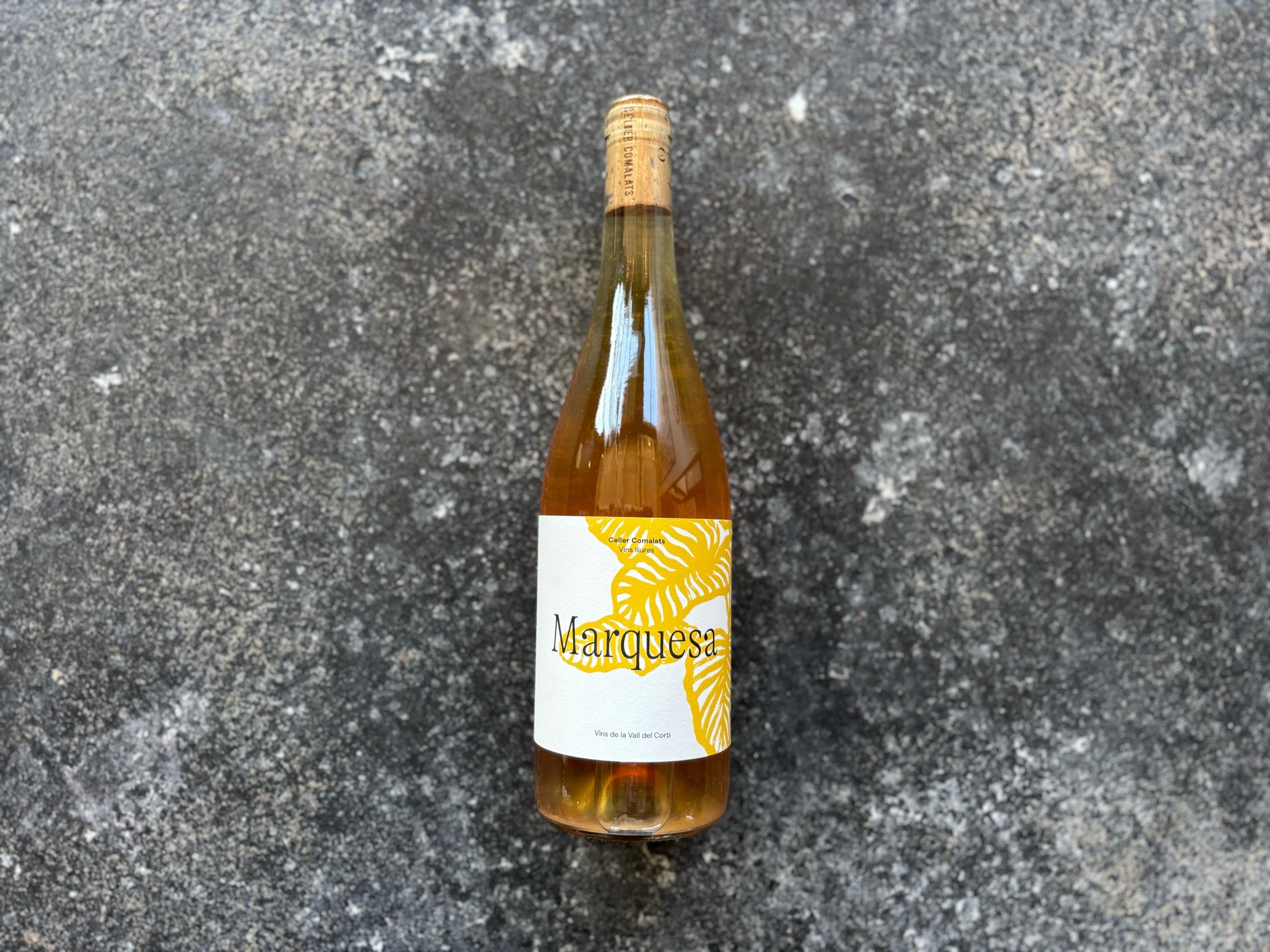Celler Comalats ‘Marquesa’ Blanco 2023
Location: Spain, Catalunya
Winemaker: Eva, Eloi and Núria Bonet
Grapes: Picapoll (Picpoul Blanc)
Soil: Clay, calcareous
Winemaking: Organic and biodynamic farming. Grapes are harvested by hand. Maceration for five days on the skins before pressing. Fermented with indigenous yeast. Aged in Amphora. No fining or filtering. No added Sulfur.
‘Marquesa’- Zesty orange peels and blossoms dance together in this fresh yet elegant maceration where each sip begs for the next. Like this cuvée’s royal namesake, exuberant and still poised.
From the Importer Super Glou: In the Far West of Catalunya lies the province of Lleida, a place so sprawling and remote that a traveling American might expect to see the Tetons rising in the distance. In the dead center of Lleida sits the comarca of Segarra. Perched high on a plain, above waves of grain dotted with pine trees and evergreens, there is a village named for an almond and also shaped like one: L’Ametlla de Segarra. In this village stands a cylindrical stone core—all that remains of an old castle built by the Templars—and at the top of this tower is Eva Bonet, la marquesa: the queen.
We are surveying the village below, comprised of just nine people (including Paula and Agustí of Cal Xurriu), the population swelling to forty during the summertime. Eva is the mayor, la marquesa being a term of endearment ascribed to her. Her full fictional title is La Marquesa de la Garnatxa, reflecting her penchant for the grape Garnacha, which she is deeply in love with promoting in her official capacity as mayor and winemaker at Comalats.
Comalats is named for the wooded foothills surrounding the region and also for the project brought to life by Eva’s late father, whose dream it was to revive winemaking here amid the grain farming that had come to dominate (Eva says it was also his dream to be able to export these wines, which is happening now for the first time). Their family has inhabited L’Ametlla de Segarra for seven hundred years. In the 70s, they saw vineyards fall into neglect as the population of Segarra moved to Barcelona in search of jobs that didn’t involve agriculture. Vines were ripped out, or laid to waste. It was not until the '90s that Jaume Bonet, Eva’s father, decided to plant Cabernet Sauvignon—a political act that would become Celler Comalats.
Celler Comalats now flourishes through the joint effort of Eva and her siblings Núria and Eloi, who cultivate twelve hectares of clay and limestone planted to organic Garnacha, Picapoll, Syrah and Cabernet Sauvignon. When we say ‘organic’ we mean certified by the CCPA (Catalan Council of Ecological Agricultural Production) and protected by the total absence of industrial pollution, given the high altitude (diseases and pests tend not to thrive at 710m above sea level) and the remoteness (the closest traffic is 20km away). Their vines are pristine. What’s more, the wine those vines produce offers us a chance: to taste the modern day, to taste the past, to taste the tension in between. Standing in the comalats, gazing out over their land, Eva’s husband Ricard puts it like this: “when you drink a bottle, you’re not only drinking wine. You’re drinking a family’s history, the difficulties, the challenges… you’re drinking the whole story.”
We are honored to take part in their narrative—and to give you the opportunity, too.
Location: Spain, Catalunya
Winemaker: Eva, Eloi and Núria Bonet
Grapes: Picapoll (Picpoul Blanc)
Soil: Clay, calcareous
Winemaking: Organic and biodynamic farming. Grapes are harvested by hand. Maceration for five days on the skins before pressing. Fermented with indigenous yeast. Aged in Amphora. No fining or filtering. No added Sulfur.
‘Marquesa’- Zesty orange peels and blossoms dance together in this fresh yet elegant maceration where each sip begs for the next. Like this cuvée’s royal namesake, exuberant and still poised.
From the Importer Super Glou: In the Far West of Catalunya lies the province of Lleida, a place so sprawling and remote that a traveling American might expect to see the Tetons rising in the distance. In the dead center of Lleida sits the comarca of Segarra. Perched high on a plain, above waves of grain dotted with pine trees and evergreens, there is a village named for an almond and also shaped like one: L’Ametlla de Segarra. In this village stands a cylindrical stone core—all that remains of an old castle built by the Templars—and at the top of this tower is Eva Bonet, la marquesa: the queen.
We are surveying the village below, comprised of just nine people (including Paula and Agustí of Cal Xurriu), the population swelling to forty during the summertime. Eva is the mayor, la marquesa being a term of endearment ascribed to her. Her full fictional title is La Marquesa de la Garnatxa, reflecting her penchant for the grape Garnacha, which she is deeply in love with promoting in her official capacity as mayor and winemaker at Comalats.
Comalats is named for the wooded foothills surrounding the region and also for the project brought to life by Eva’s late father, whose dream it was to revive winemaking here amid the grain farming that had come to dominate (Eva says it was also his dream to be able to export these wines, which is happening now for the first time). Their family has inhabited L’Ametlla de Segarra for seven hundred years. In the 70s, they saw vineyards fall into neglect as the population of Segarra moved to Barcelona in search of jobs that didn’t involve agriculture. Vines were ripped out, or laid to waste. It was not until the '90s that Jaume Bonet, Eva’s father, decided to plant Cabernet Sauvignon—a political act that would become Celler Comalats.
Celler Comalats now flourishes through the joint effort of Eva and her siblings Núria and Eloi, who cultivate twelve hectares of clay and limestone planted to organic Garnacha, Picapoll, Syrah and Cabernet Sauvignon. When we say ‘organic’ we mean certified by the CCPA (Catalan Council of Ecological Agricultural Production) and protected by the total absence of industrial pollution, given the high altitude (diseases and pests tend not to thrive at 710m above sea level) and the remoteness (the closest traffic is 20km away). Their vines are pristine. What’s more, the wine those vines produce offers us a chance: to taste the modern day, to taste the past, to taste the tension in between. Standing in the comalats, gazing out over their land, Eva’s husband Ricard puts it like this: “when you drink a bottle, you’re not only drinking wine. You’re drinking a family’s history, the difficulties, the challenges… you’re drinking the whole story.”
We are honored to take part in their narrative—and to give you the opportunity, too.
Location: Spain, Catalunya
Winemaker: Eva, Eloi and Núria Bonet
Grapes: Picapoll (Picpoul Blanc)
Soil: Clay, calcareous
Winemaking: Organic and biodynamic farming. Grapes are harvested by hand. Maceration for five days on the skins before pressing. Fermented with indigenous yeast. Aged in Amphora. No fining or filtering. No added Sulfur.
‘Marquesa’- Zesty orange peels and blossoms dance together in this fresh yet elegant maceration where each sip begs for the next. Like this cuvée’s royal namesake, exuberant and still poised.
From the Importer Super Glou: In the Far West of Catalunya lies the province of Lleida, a place so sprawling and remote that a traveling American might expect to see the Tetons rising in the distance. In the dead center of Lleida sits the comarca of Segarra. Perched high on a plain, above waves of grain dotted with pine trees and evergreens, there is a village named for an almond and also shaped like one: L’Ametlla de Segarra. In this village stands a cylindrical stone core—all that remains of an old castle built by the Templars—and at the top of this tower is Eva Bonet, la marquesa: the queen.
We are surveying the village below, comprised of just nine people (including Paula and Agustí of Cal Xurriu), the population swelling to forty during the summertime. Eva is the mayor, la marquesa being a term of endearment ascribed to her. Her full fictional title is La Marquesa de la Garnatxa, reflecting her penchant for the grape Garnacha, which she is deeply in love with promoting in her official capacity as mayor and winemaker at Comalats.
Comalats is named for the wooded foothills surrounding the region and also for the project brought to life by Eva’s late father, whose dream it was to revive winemaking here amid the grain farming that had come to dominate (Eva says it was also his dream to be able to export these wines, which is happening now for the first time). Their family has inhabited L’Ametlla de Segarra for seven hundred years. In the 70s, they saw vineyards fall into neglect as the population of Segarra moved to Barcelona in search of jobs that didn’t involve agriculture. Vines were ripped out, or laid to waste. It was not until the '90s that Jaume Bonet, Eva’s father, decided to plant Cabernet Sauvignon—a political act that would become Celler Comalats.
Celler Comalats now flourishes through the joint effort of Eva and her siblings Núria and Eloi, who cultivate twelve hectares of clay and limestone planted to organic Garnacha, Picapoll, Syrah and Cabernet Sauvignon. When we say ‘organic’ we mean certified by the CCPA (Catalan Council of Ecological Agricultural Production) and protected by the total absence of industrial pollution, given the high altitude (diseases and pests tend not to thrive at 710m above sea level) and the remoteness (the closest traffic is 20km away). Their vines are pristine. What’s more, the wine those vines produce offers us a chance: to taste the modern day, to taste the past, to taste the tension in between. Standing in the comalats, gazing out over their land, Eva’s husband Ricard puts it like this: “when you drink a bottle, you’re not only drinking wine. You’re drinking a family’s history, the difficulties, the challenges… you’re drinking the whole story.”
We are honored to take part in their narrative—and to give you the opportunity, too.

